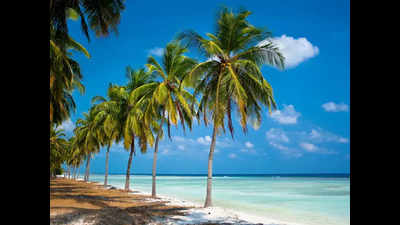- News
- City News
- varanasi News
- BHU professors discover DNA ancestry of Lakshadweep natives
Trending
This story is from August 22, 2019
BHU professors discover DNA ancestry of Lakshadweep natives
Against the popular belief that the early settlers of Lakshadweep were either from the Andaman and Nicobar Islands or from South Africa, professors of Banaras Hindu University (BHU) have found that people from north and south India made the atolls of the tropical archipelago their home.

The study is significant because the scientific community can now customise medical treatment in Lakshadweep.
Against the popular belief that the early settlers of Lakshadweep were either from the Andaman and Nicobar Islands or from South Africa, professors of Banaras Hindu University (BHU) have found that people from north and south India made the atolls of the tropical archipelago their home.
The pioneering four-year study — based on DNA sequence of natives — has been conducted by professor Gyaneshwar Chaubey of BHU and his counterparts at BHU, Birbal Sahni Institute of Palaeosciences (Lucknow), Mangalore University (Karnataka) and Centre for Cellular and Molecular Biology (Hyderabad), among others.The report, titled ‘The Peopling of Lakshadweep Archipelago’ has been published in the British multidisciplinary scientific journal Nature.
“Around 64,000 people inhabit approximately 78,000sqkm area across the 36 islands in the Arabian Sea. We processed the DNA of 557 people from eight major islands of Lakshadweep and found that the maternal linkage of the DNA of the populace is from southern India and the paternal heritage is from parts of northern India” professor Chaubey said.
The maternal ancestry of the Agatti, Andorth, Bitra, Chetlat, Kadmat, Kalpeni and Kiltan islands is largely derived from southern India, whereas paternal ancestry shows higher affinity with the populations of the Maldives or northern and western parts of South Asia, including north India, the study noted. The most diverse island is Minicoy, which might have served as a popular destination for maritime sailors and thus, received gene flow from various directions, it added.
In a second phase of the study, the team from Varanasi, Lucknow, Mangalore and Hyderabad will revisit the islands in November to prepare a detailed phenotype of local residents, including height, weight, blood pressure and common genetic diseases.
“We will be able to develop what is called a ‘genotype-phenotype chip’, which will make it easy for doctors to screen a patient for hundreds of diseases,” Chaubey said. “They being unique and isolated people, preserving their ethnicity and catering to their medical needs will be much more easier with these findings,” he explained.
The pioneering four-year study — based on DNA sequence of natives — has been conducted by professor Gyaneshwar Chaubey of BHU and his counterparts at BHU, Birbal Sahni Institute of Palaeosciences (Lucknow), Mangalore University (Karnataka) and Centre for Cellular and Molecular Biology (Hyderabad), among others.The report, titled ‘The Peopling of Lakshadweep Archipelago’ has been published in the British multidisciplinary scientific journal Nature.
“Around 64,000 people inhabit approximately 78,000sqkm area across the 36 islands in the Arabian Sea. We processed the DNA of 557 people from eight major islands of Lakshadweep and found that the maternal linkage of the DNA of the populace is from southern India and the paternal heritage is from parts of northern India” professor Chaubey said.
The maternal ancestry of the Agatti, Andorth, Bitra, Chetlat, Kadmat, Kalpeni and Kiltan islands is largely derived from southern India, whereas paternal ancestry shows higher affinity with the populations of the Maldives or northern and western parts of South Asia, including north India, the study noted. The most diverse island is Minicoy, which might have served as a popular destination for maritime sailors and thus, received gene flow from various directions, it added.
The study is significant because the scientific community can now customise medical treatment in Lakshadweep. “DNA of a clan or community is like a super-computer that stores all the information regarding ancestry. It equips researchers in a better way to confront ailments prevalent on the island,” professor Chaubey said.
In a second phase of the study, the team from Varanasi, Lucknow, Mangalore and Hyderabad will revisit the islands in November to prepare a detailed phenotype of local residents, including height, weight, blood pressure and common genetic diseases.
“We will be able to develop what is called a ‘genotype-phenotype chip’, which will make it easy for doctors to screen a patient for hundreds of diseases,” Chaubey said. “They being unique and isolated people, preserving their ethnicity and catering to their medical needs will be much more easier with these findings,” he explained.
End of Article
FOLLOW US ON SOCIAL MEDIA










